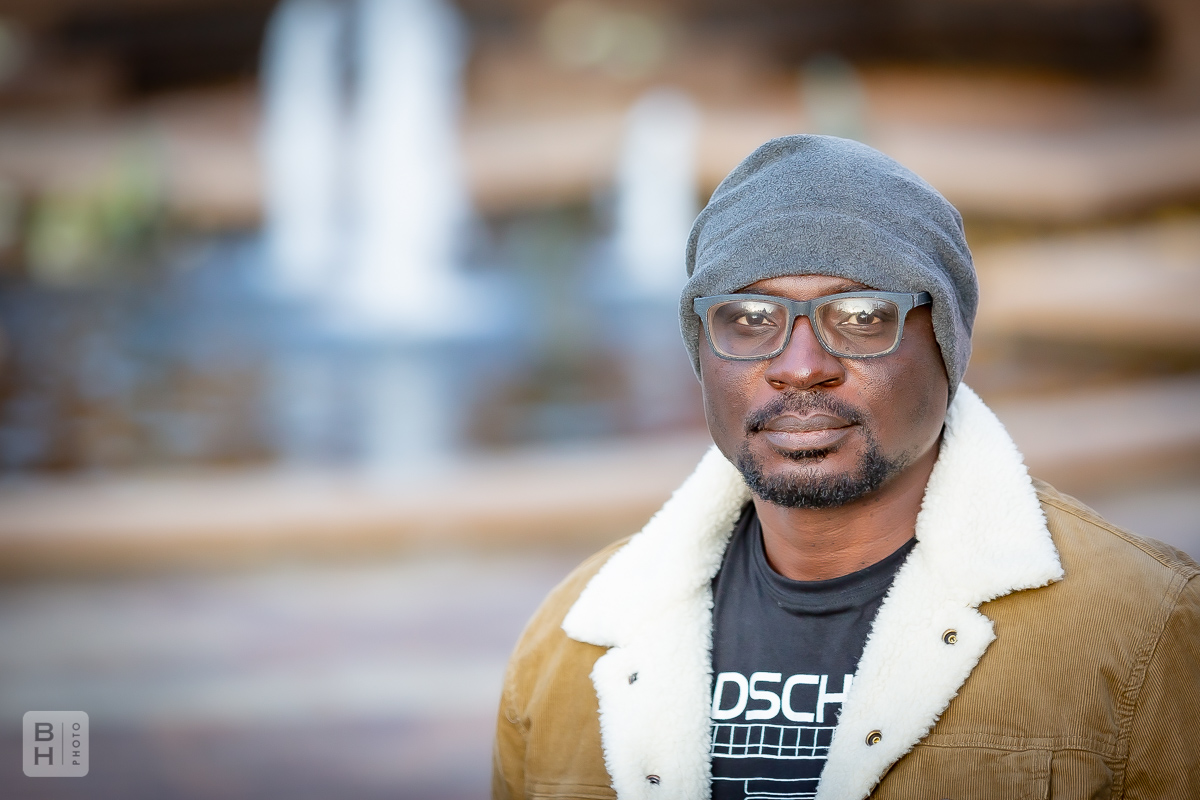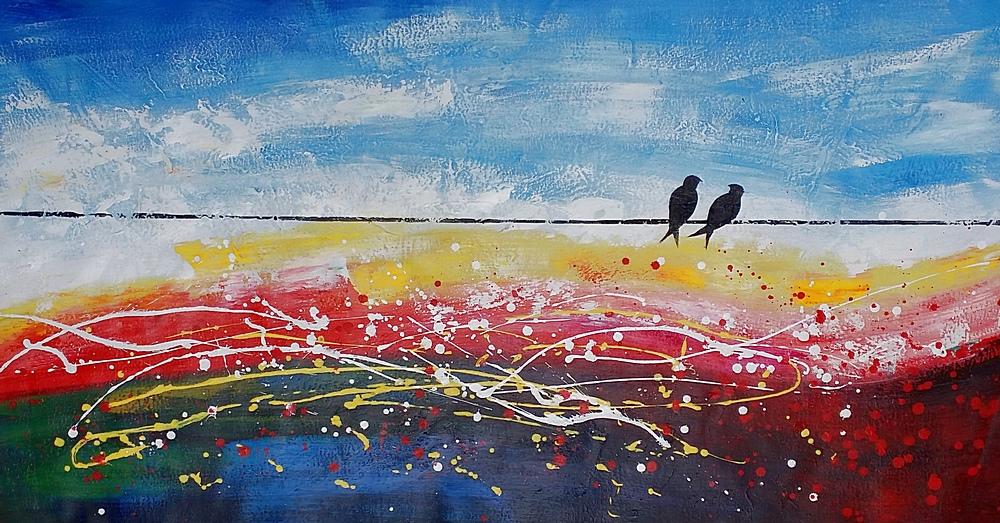It was in the dusk of harmattan when the dogonyaro tree swayed to the left and to the right producing an almost frigid temperature. The earth rose with vengeance, turning the hair and faces of pedestrians sand-like. The woman selling akara was attending to anxious children who were trying too hard to get to school before assembly time. The men who owned shops around traded, mostly sweets and biscuits, as if in a race with the breeze.
Everyone seemed aware that they were walking on a time bomb that might explode sooner than later. Death is a certainty to every human but what makes it bearable is the illusion of safety that humans over the years create for themselves. But the people of Biu local government did not seem to share this illusion with the rest of the world. They have realised that the guns and ammunition soldiers and police carry around to protect them might as well be used to create terror.
Hyelni didn’t grow up around toy guns. In fact at the time, toy guns were rare while the real ones were everywhere. She had witnessed more than once when a gun had been used to end people’s lives, people to whom she had said good morning, good afternoon or other salutations expected of a well-trained 10-year-old girl. Many a time, when she dodged a bullet, she would say as her mother had taught her, “Alhamdullilah”, all praises to Allah. She was grateful for getting another second, minute or week to live.
On one occasion, Hyelni’s social studies teacher took a different turn while teaching the pupils on values and started talking to them about hope for the future and faith in God. Hyelni knew her teacher was saying nonsense. Hope was too enormous a concept for her brain to wrap round and she knew for a fact that none of those sitting in the class that moment believed Mrs. Aisha. Dahiru, the noisy small boy that had a permanent seat in front, died as a result of a bomb blast in the market. He was helping his mother sell ugwu. Amina, the girl that never seemed to understand anything, had been missing since last month and is yet to be found. Hyelni’s bosom friend, Kucheli, had not been in school for almost two months because she was yet to overcome the trauma of being assaulted by insurgents that raided their house, ripped her clothes and took turns on her. Aliyu died after a bomb was detonated in the mosque beside their house. From what Hyelni heard, Aliyu didn’t want to go to the mosque that early but his mother insisted he had to start praying with the other men in the house.
Hyelni had not watched her classmates die but she witnessed the death of her brother and her father, and the abduction of her mother. Hyelni was squatting over the pit they used as toilet, answering the call of nature when the men entered her compound. Her father knew the insurgents were in their village as soon as sporadic gunshots announced their arrival. But her parents, like the other people in the village, knew it was futile to run, and so whenever the insurgents came, they always mutter to death: “not today” like Arya does in Game of Thrones. But it seemed like death came with a mind of its own when the insurgents slaughtered Hyelni’s brother and father like rams. Only that they cut them through the back of their necks and forced Hyelni’s mother into the back of their truck. Hyelni saw all that through the holes of the toilet’s zinc door.
The last she remembered were her eyes hovering round her father’s lifeless body and her brother’s head detached from his entire frame. She woke up to lots of people around her. As she made to sit up, Maman Kucheli, the oldest woman in the village gave her a pitiable look and gestured her to lay still. Hyelni knew what all this was about. She could feel the remnant of the unfinished business she was doing in the toilet still stuck in her anus. She made to sit up again, and this time, many eager hands helped her up. She walked outside and heard some of the women talking in hush tones. They talked about how lucky Hyelni was to have survived and how God had plans for her.
Hyelni was just ten but it seemed to her that she might be the only logical person in the whole village. She wasn’t lucky. She only could see that there was really nothing worth living for. Just when she reached for the door of the toilet, everything dawned on her. She knew her brother and father were dead; she was sure they had been buried when she passed out. She is unsure of what they did to her mother.
She wanted to cry, but the tears just won’t form. Her eyes were clear, white and still. The questions that kept going through her mind didn’t have to do with her parents or her brother. It had to do with her. She taunted her young mind with the questions about who she was, what her life was worth, and where she was going or who she was moving in with.
For the first time, she understood what the word, orphan, was intended to mean. To be an orphan is to be alone in a crowded market, to have no one to share a name or a unique features with. She knew she would never see her brother again but wished God could bring him back, even if it’s just for three days. He had done it before, she thought. Is that not what he did with Jesus? She questioned herself. She heard Mrs. Christie say so when she was teaching Christian religion knowledge to some pupils. She thought Mrs Christie was just bluffing, but right now she really wanted to believe that is possible. She would give anything to have her brother back; she promised God that if he ever brings her brother back, she won’t get angry with anyone that comments on how much they looked alike nor cry when her father commends her brother’s school work over hers.
“I should have clapped louder when Ali got 100% in mathematics,” she said aloud.
She remembered her father, how he woke up every morning to clean his motorcycle that was already rusting away, and how her mother used to tell him that with the kind of smoke that the motorcycle produced, he shouldn’t bother telling people that he doesn’t smoke cigarette.
As her legs started to ache, she realised she had been squatting over the pit for far too long. She hurriedly washed up and walked outside she saw the mortar and pestle her mother had washed just some hours back and remembered how everyone was excited on the thought of eating pounded yam for dinner. She closed her eyes and imagined how her mother would be pounding the yam and sweat oozing out from her forehead yet would still manage to throw her head back and laugh in a way only her mother could. Before she opened her eyes, she made a mental note never to eat pounded yam again, she won’t want to ever feel this way.
A week later, Hyelni along with few other orphans were taken to a charity foundation in Lagos. The prospect of travelling to another other part of the country brought smile and laughter to the faces of the children, but not Hyelni. The reality of starting a new life felt good; she’d completely let go of the past. She knew she was never coming back to the place she had always known as home yet she didn’t want to carry anything along with her. A day before they travelled, she burnt her favorite dress, the one her father bought for her after she cried and begged him. She threw her mother’s wristwatch in the river. The only thing she carried along with her was her brother’s favorite pencil, and that is because she hid it from him days before he was killed, and when she felt it in her jeans, she held on to it for a while. As they passed the route leaving Maiduguri to Yobe, she threw it out through the window.
When they got to Lagos, the only thing she couldn’t get over was the familiar faces of the other children. So, she deliberately tried to mismatch their names and faces. Whenever anyone tried to correct her, she replied with “Okay, big head.” Soon, she had made an enemy of all the kids she came with and succeeded in making half of the kids they met there hate her. The first Yoruba words she learnt were insults, and she reserved any new insult she had learnt for the other kids at the foundation. And to the other kids that did not understand Hausa, she relished in saying despicable things to them in Hausa.
She refused to utter a word about what happened to her parents and that bothered Mrs. Adebisi, the director of Charity Foundation who made it a routine to call Hyelni to talk to her. But whenever she asked her about her parents, all Hyelni said was “They are dead.”
When the proprietor of Queens’ Only Boarding School wrote to offer full scholarship to one of the orphans, she knew which one to let go. But to be fair, she decided to give the girls at her foundation a mathematics test. Hyelni knew all the answers, but she left her paper blank. A week after the test, Mrs. Adebisi announced that Hyelni passed and she will be going to Queens’ Only Boarding School. At that moment, Hyelni knew Mrs. Adebisi wanted to get rid of her. For the first time, since her loss, she let a tear fall. Mrs. Adebisi saw her fighting tears and invited her to her office.
“You will come back for holidays,” Mrs. Adebisi told her while stroking her back. “I felt a new environment with girls from different background would be good for you.”
Hyelni didn’t say anything; she just thanked her and left. She wasn’t one to relish in a bad situation for long.
On her first day at Queens’ Only, she realised she had to change almost everything about herself to fit in. She heard names she had never heard before. There was an Amarachi, Chinenye, Busayo, Ife and so many strange names she didn’t even bother pronouncing. And all the girls she met seemed anxious to change her name from Hyelni to Helen; she tried to argue at first but when she realised that pronouncing Hyelni was as much a torture to them as pronouncing their names was to her, she decided to give in.
The Monday after she resumed, she went to the administration office to complete her registration. The lady at the front desk asked for her name and she said Helen Abdullahi. That was her first mistake. When the lady reached the box for religion, she ticked Christianity without consulting her, and that was when it really stroked Hyelni. What religion does she really belong to? Her parents were Muslims, but she had not been a Muslim since she came to Lagos, in fact she had not been a Christian either. So she made a quick decision on how futile it would have been to protest, so she kept quiet and decided that being a Christian wouldn’t be a bad idea after all.
English class was the first she attended at the school. Miss Badiru, their teacher, asked them to write an essay about their family. The next day Miss Badiru came to the class smiling, she called Helen out and told the class how impressed she was about Helen’s essay and asked Helen to read out her essay before the class. Everything Helen wrote in that essay was fabricated. She wrote that she was an only child of a Major General of the Nigerian Army and her mother was a Medical Doctor. She wrote stories her fabricated father told her about how he defeated the insurgents. When she finished reading the story, an uproar of applause shook the class. She became everyone’s friend, even those she didn’t like tried everything to be on her list of favored persons.
At end of the term, Helen knew she had to find a way to avoid the foundation’s bus from coming to pick her, because if that ever happened, everyone would know she was a scam. She knew the bus would come to her school only through one route, so when they were dismissed, she carried the small duffle bag in which she kept her few possessions and snuck out of the school through the school fence. She passed Royal Hospital, passed the down sloppy road and got to Sabo market. There she waited to ambush the bus. Exactly at 3:05 pm, the bus got to her and she waived it to stop.
Hyelni returned to the foundation with the mindset that everyone there hated her. But the moment she entered, she realised how wrong she had been. Most of the kids were no longer there; they got families to adopt them. Instead, they were new faces. And with what Hyelni could decipher from their faces, they were excited to meet her. She stopped picking fights and would gather the other children that didn’t come from Maiduguri and tell them lies about how she had killed a man with a stick and covered him with leaves. Her real intent of telling them the stories was to make them fear her, but she fascinates them instead. So they spend all their time around her like little puppies to a bitch. Soon her holiday rolled out, and another term came.
Now fifteen and in Jss3, Helen’s breasts were round and slightly plump; her buttocks, firm perfectly complementing her slender waist – features of a woman that would one day become a beauty. She could pass for a model with a height like hers.
Mr Oseni, her English teacher, took a special interest in her after he read a poem she wrote at the back of her English notebook:
I suspected myself of insanity
For amidst my tears
I searched for you
Hundred years gone
You were as close to my heart
As a child to his mother’s breast
Oh! Forgotten love
Memories of you are now in oblivion
The sound of your name is
As unclear as the rage of
the ocean in a strong wind
He invited her to read the poem to him. That was the beginning of their friendship. He would call her to the staffroom under the pretense of extra tutorials, and they would talk until she had exhausted her free periods. He never told her a thing about himself, but he listened to all she had to say about herself. She told him nothing but the truth.
After a while, curious Hyelni asked Mr Oseni to tell her about himself. He laughed and said, “I can’t tell you about myself without crying my eyes out. And I wouldn’t want to cry in the staffroom.” He asked her to meet him outside school at night and she didn’t hesitate to answer in the affirmative.
At 8 pm, she snuck out of school through the fence as they had earlier planned; he was waiting receive her. She changed into the clothes she had brought along. They passed all the restaurants around Yaba, but he didn’t stop. She got a little worried but shrugged it off with the thought that he might want to take her to a place with fewer eyes. He drove to a motel on Bode Thomas in Surulere. When he stopped at the motel, Hyelni tried not to flinch but fear was spelt in bold letter on her face. She was just fifteen, but she knew she had reasons to be scared.
“Don’t be scared,” he said, correctly reading her thoughts. “No one can ever find us here.” He paid for a room and got a key. When he opened the room, Hyelni sat on a screeching chair and tried to take an inventory of the room. The room smelt of cheap air freshener; the white bed sheet had obvious stains. He sat down on the bed and faced her.
“My Father died before I was born,” he started, nudging her to rest on the best, “and my mother only lived long enough to hear me cry or so I was told. My aunt took me in and as soon as I could walk, she started to maltreat me. She would beat me over every little thing I did wrong and would give me spoilt food whenever I complained of hunger.”
He continued. Helen looked at him, he was crying. As she moved closer to him, he drew her to sit on his laps.
“Shhh,” she tried to comfort him.
He grabbed her and buttoned her dress from the top. She tried to stop him but another part of her wanted to see how far that would go. When she had no clothes on again and he had removed his pair of trousers, she realised what she was up against.
“No!” she screamed but there was no going back. His hands already covered her mouth and his finger roughly spread her vagina lips. First, it was one finger, then two. She had never felt so much physical pain before. His weight on her was suffocating her, but he didn’t care; once he got enough opening, he inserted himself into her. Her body was ripped into two – or so she felt. She closed her eyes to allow the tears a better opportunity to stream down. She counted the strokes, one, two, three… he stopped at twenty after which he laid on her. She made to push him away but after a great deal of effort, he stood up on his own.
She couldn’t look at him, but another part of her urged her to be grateful that she was there for him in his time of pain. She should be happy that he shared his pains with her. When he started to snore, Helen got up from the bed after many futile attempts. On reaching the bathroom, she realised water wasn’t running from the tap and there was only a half-filled dirty bucket of water. She washed herself and went back to the room.
Mr. Oseni never spoke to Helen about what happened between them. It even seemed as though he was avoiding her. On one of the Mondays that followed, Helen was in the staffroom when she heard the teachers talking about why Mr. Oseni had been unavailable. They all agreed that it was because his wife had returned from her trip overseas. Helen left the staffroom, without getting the book she had come for. She couldn’t believe Mr. Oseni had been married all along. She wished the ground would be kind enough to open up for her to enter, but she wanted an explanation from him. After she analysed everything in her head, she realised she didn’t deserve one. God is yet to explain to her why he took her family away from her, so why should she expect an explanation from a mere mortal? She buried whatever had happened between her and Mr. Oseni, and promised herself never to relive it again.
The problem with burying things is that you wouldn’t know how it would sprout. After two months of not seeing her menstrual flow, she knew she was pregnant. And she heard from school gossip that some girls in her school have distinguished themselves in the art of terminating pregnancy using an iron hanger. She decided to confide in her school mother, who in turn told her friend who decided to perform the abortion. On the day of the abortion, everything was ready. She laid down naked on the lower bunk bed, her legs wide open. Amina, the girl that would be performing the operation, had already straightened the iron hanger and curved the edge just enough to allow her insert it into Helen’s Vagina. The last thing Helen remembered was an excruciating pain from beneath her.
She woke up on a different bed, not the bunk bed she remembered. The voices that were playing in her head were neither her school mother’s nor Amina’s.
Written by : Michael Afenfia
Subscribe To My Newsletter
BE NOTIFIED ABOUT BOOK SIGNING TOUR DATES
Subscribe to my newsletter




[…] Also Read: My Name is Sorrow by Hassana U Maina […]
Beautiful❤